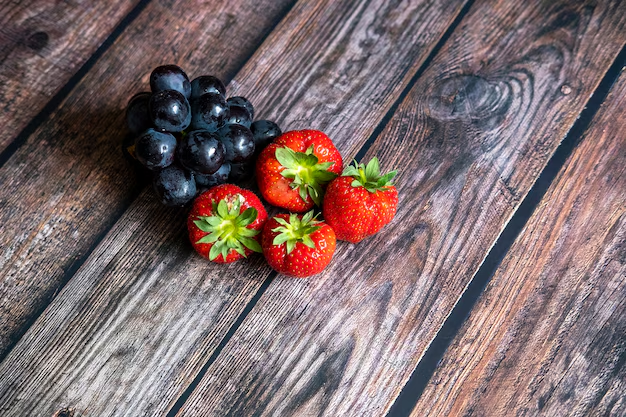How To Store Blueberries For Maximum Freshness: Should You Refrigerate Them?
Imagine you're standing in your kitchen, fresh from the grocery store or local farmers' market, with a carton of plump, juicy blueberries in hand. Their deep color promises a burst of flavor and health benefits. But before you pop one into your mouth or sprinkle them over your breakfast, an important question arises: Where should you store them to maintain their freshness and nutritional value? This article delves into the question of whether blueberries should be stored in the refrigerator, providing a comprehensive look at food storage practices and helping you make informed decisions on extending their shelf life.
Why Freshness Matters
The delightful taste and health benefits of blueberries make them a popular choice for many. As a source of vitamins, antioxidants, and fiber, these berries are a staple in smoothies, salads, and desserts. However, to ensure you get the most out of your berries, it's important to store them correctly. Storing blueberries properly not only maintains their taste but also preserves their nutritional value, protecting your investment in healthy eating.
Storing Blueberries: Refrigeration vs. Room Temperature
Refrigeration: The Common Choice
Keeping blueberries in the refrigerator is a widely recommended practice. By storing them at a cool temperature, typically around 40°F (4°C), the ripening process slows significantly. This means that you can extend their freshness and reduce the risk of mold development.
Advantages of Refrigerating Blueberries:
- 🌡 Slows Spoilage: The cool environment of the refrigerator inhibits the growth of bacteria and mold, which are more active at room temperature.
- 🧊 Maintains Firmness: The firm texture of blueberries is preserved longer when they're stored in a chilled environment.
- 🌞 Flavor Preservation: Cool temperatures help to maintain the berries' subtle flavors and aroma over a longer period.
Room Temperature: A Short-Term Fix
If you plan to consume your blueberries within a day or two, storing them at room temperature can be a convenient option. This method is suitable when you want to enjoy their natural warmth and flavor straight from the container.
Advantages of Storing Blueberries at Room Temperature:
- 🍽 Immediate Use: Blueberries kept at room temperature are ready to eat and require no additional warming.
- 🍇 Enhanced Sweetness: Some people find that room-temperature blueberries have a slightly intensified sweetness compared to their refrigerated counterparts.
The Balance: When to Choose Each Method
While refrigeration is generally recommended for prolonged freshness, there are scenarios where room temperature storage can work. Consider your consumption plans and how soon you intend to finish the berries. For extended freshness beyond a couple of days, refrigeration is the best bet. However, if you need them within the day, keeping them on the countertop is sufficient.
Tips for Optimal Blueberry Storage
Regardless of your chosen storage method, following these best practices ensures that your blueberries stay fresh and tasty:
- Do Not Wash Until Ready: Moisture promotes mold growth. Only wash blueberries right before consumption to keep them dry and mold-free.
- Use Containers Wisely: If storing in the refrigerator, keep them in a breathable container to avoid trapping moisture. A shallow container or a vented basket often works best.
- Inspect and Sort: Check the blueberries for moldy or squished ones before storage. Removing these helps prevent the spread of mold to healthy berries.
📝 Quick Storage Tips for Blueberries
- Refrigerate your blueberries to extend their freshness by reducing spoilage.
- Room Temperature storage is ideal for immediate consumption within a day.
- Wait to Wash them until you're ready to eat. Moisture is their enemy.
- Separate Damaged Berries from the others to prevent mold spread.
Exploring Related Storage Topics
Comparing Storage Needs with Other Berries
Blueberries aren't the only berries that benefit from proper storage techniques. Here's a brief look at how they compare:
- Strawberries: Like blueberries, they benefit from refrigeration and should not be washed until you're ready to eat.
- Raspberries: Extremely delicate and prone to mold, raspberries often require even more stringent storage and need refrigeration.
- Blackberries: Similar to blueberries, they store well in the fridge and need to be handled gently due to their delicate nature.
Understanding the Shelf Life of Blueberries
The typical lifespan of refrigerated blueberries can be approximately one to two weeks, depending on their freshness at the time of purchase. By contrast, room temperature storage usually limits shelf life to about two days. These guidelines vary based on several factors, including berry ripeness and storage conditions.
Innovation in Food Storage: Vacuum Sealing and Other Techniques
Advancements in food storage technology can enhance the longevity of blueberries:
- Vacuum Sealing: Removing air from packaging can extend the freshness by creating an environment where spoilage organisms can't thrive.
- Freezing: For even longer-term storage, freezing blueberries is a viable option. When ready, you can use frozen blueberries in smoothies and baked goods.
Key Takeaways for Blueberry Enthusiasts
Storing blueberries is about preserving both their delightful taste and powerful nutrients. Here’s what you should take away:
- Refrigeration is Your Friend: For longer storage, always refrigerate, utilizing breathable containers and waiting to wash until consumption.
- Room Temperature for Immediate Enjoyment: Only suitable when you plan to consume them quickly.
- Stay Vigilant: Regularly check your berries, sorting and handling them gently to keep them fresh.
Blueberries are a precious and nutritious addition to any diet. By applying the right storage techniques, you can make the most out of their benefits while enjoying their fresh taste, whether served on a breakfast plate or as a quick snack.
In your journey to master food storage, understanding the particular needs of different produce like blueberries is pivotal. With these insights, you're now better equipped to maximize freshness and enjoy nature’s bounty at its best. Happy berry storing!

